Commercial real estate investing can be a lucrative venture, but it requires careful analysis and evaluation.
To make informed decisions, you need the right tools at your disposal.
These tools can help you assess market trends, property values, and potential returns on investment.

By utilizing specialized tools for evaluating commercial real estate deals, you can gain valuable insights and reduce investment risks. These resources range from financial analysis software to market research platforms, each offering unique capabilities to support your decision-making process.
With the right combination of tools, you’ll be better equipped to identify promising opportunities and navigate the complexities of commercial real estate transactions.
1) PropStream
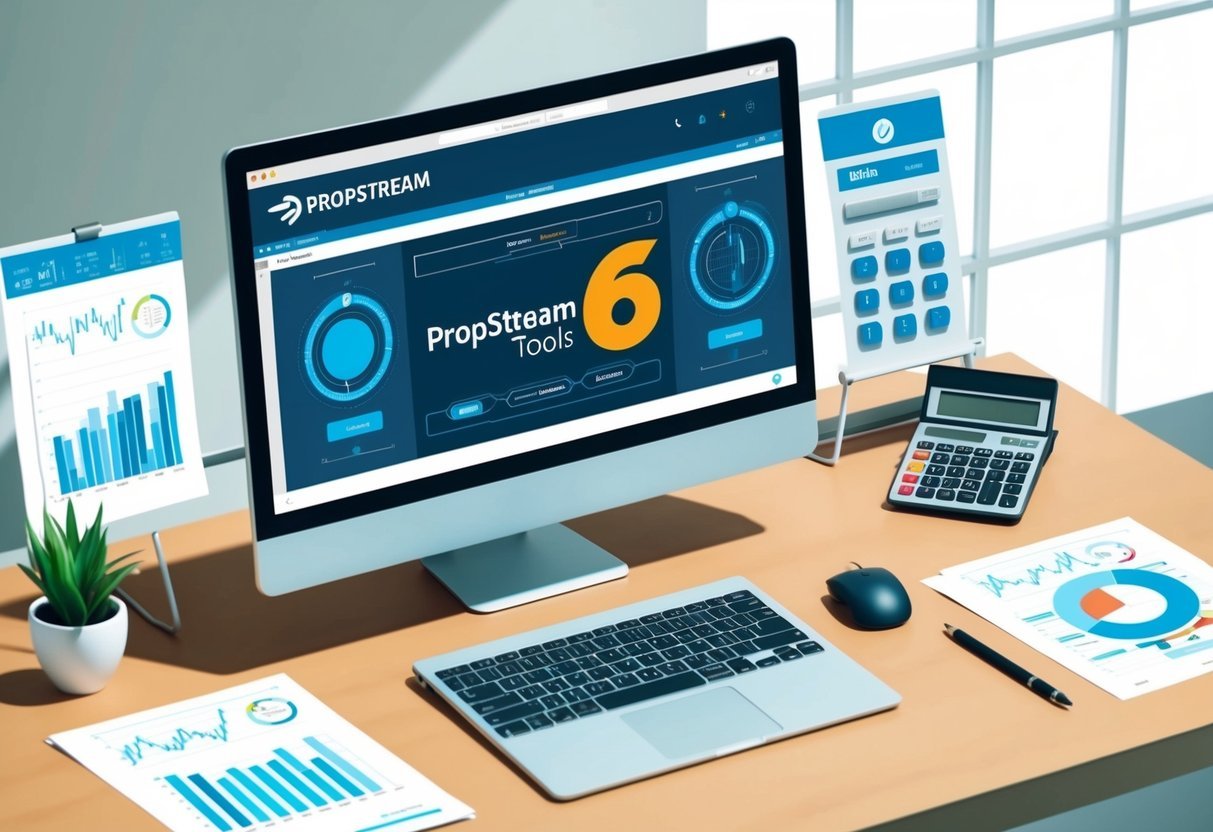
PropStream is a powerful software tool for real estate investors and professionals.
It provides comprehensive data and analytics to help you evaluate commercial properties.
With PropStream, you gain access to a vast database of property information.
This includes ownership details, transaction history, and property characteristics for millions of listings nationwide.
The platform offers advanced search capabilities to find potential investment opportunities.
You can filter properties based on specific criteria like location, property type, and financial metrics.
PropStream’s comps feature allows you to analyze comparable properties in the area.
This helps you accurately assess the value of a commercial property you’re considering.
The software provides detailed financial analysis tools.
You can evaluate cash flow potential, estimate renovation costs, and calculate potential returns on investment.
PropStream also offers marketing features to help you reach out to property owners.
You can create targeted mailing lists and generate customized marketing materials.
The platform is accessible via web and mobile app, allowing you to research properties on the go.
This flexibility is invaluable when you’re actively scouting locations or meeting with potential sellers.
While PropStream comes with a monthly subscription fee, many investors find the cost justified by the wealth of data and time-saving features it provides.
2) Reonomy
Reonomy stands out as a powerful tool for evaluating commercial real estate deals.
This platform leverages advanced technology to provide you with comprehensive property intelligence.
Reonomy’s machine learning algorithms process data from various sources, creating a unified language for property identification.
This allows you to access accurate and up-to-date information on commercial properties across the United States.
With Reonomy, you can easily search for properties based on specific criteria.
The platform offers detailed ownership information, property characteristics, and transaction history.
You’ll find the user-friendly interface particularly helpful when navigating through vast amounts of data.
Reonomy simplifies complex information, making it easier for you to analyze potential deals.
The platform also provides valuable insights into property valuations.
You can access market-specific cap rates, which are crucial for assessing investment opportunities in different locations.
Reonomy’s data aggregation capabilities allow you to make informed decisions quickly.
By consolidating information from multiple sources, you save time and effort in your research process.
Remember that while Reonomy offers extensive data, it’s essential to verify critical information through other sources.
Use this tool as a starting point for your due diligence process.
3) Real Capital Analytics
Real Capital Analytics is a powerful tool for evaluating commercial real estate deals.
It provides comprehensive data and analytics on property transactions globally.
You can access detailed information on property sales, pricing trends, and market activity.
This helps you make informed investment decisions based on current market conditions.
The platform covers various property types, including office, retail, industrial, and multifamily.
You’ll find data on individual properties as well as broader market trends.
Real Capital Analytics offers user-friendly interfaces and customizable reports.
These features allow you to analyze specific markets or property types that interest you.
By using this tool, you can track capital flows and identify active buyers and sellers in different markets.
This insight is valuable for understanding market dynamics and potential competition.
The platform also provides historical data, enabling you to analyze long-term trends and market cycles.
This perspective is crucial for developing sound investment strategies.
Real Capital Analytics integrates with other industry tools, enhancing its utility in your overall commercial real estate analysis.
You can combine its data with other resources to create a comprehensive view of potential investments.
Remember to leverage the platform’s benchmarking capabilities.
These allow you to compare properties and markets, helping you identify opportunities and assess relative value.
4) CoStar

CoStar is a powerful tool for evaluating commercial real estate deals.
It provides comprehensive market data and analytics to help you make informed decisions.
With CoStar, you can access detailed sales comparables for properties across various markets.
This information is crucial for accurately assessing property values and negotiating better deals.
The platform offers market and submarket reports with written and video commentary.
These insights can give you a deeper understanding of local market trends and conditions.
CoStar’s extensive database includes ownership history, tax information, and other vital details.
This data can significantly enhance your due diligence process when evaluating potential investments.
By leveraging CoStar’s resources, you can secure stronger negotiating positions for new space acquisitions.
The platform’s market knowledge is key to favorable negotiations and identifying cost-saving opportunities.
Many real estate professionals have reported substantial time savings when using CoStar.
For example, Avison Young experienced an 80-90% reduction in time spent on market research after adopting CoStar’s tools.
Remember that while CoStar is a valuable resource, it should be used in conjunction with other evaluation methods.
Combining CoStar’s data with your own analysis and local market knowledge will yield the best results in your commercial real estate endeavors.
5) CREmodels
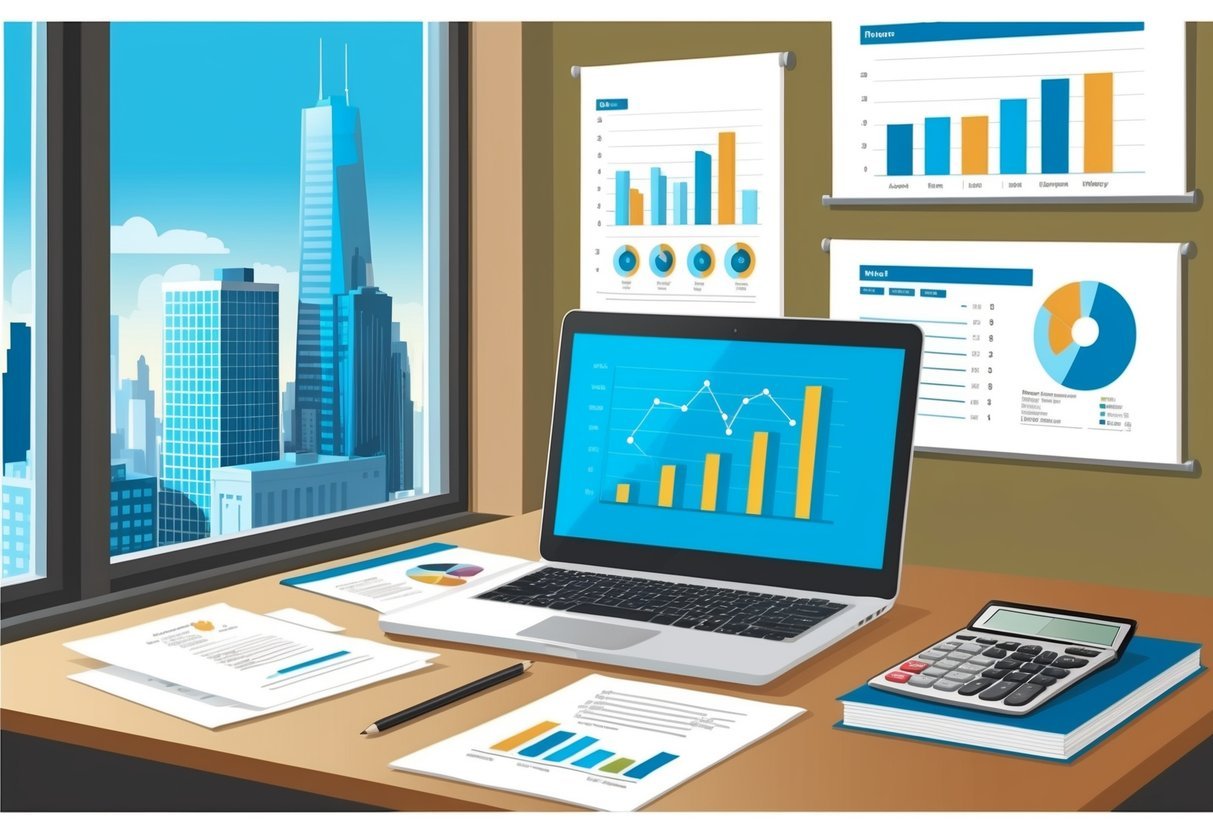
CREmodels offers a comprehensive suite of tools to assist you in evaluating commercial real estate deals.
Their flagship platform, The CRE Suite, revolutionizes how investment and development teams operate.
You’ll find The CRE Suite particularly useful for analysis, underwriting, and asset management tasks.
It streamlines your workflow and enhances the capabilities of your analysts.
When conducting due diligence, CREmodels can be an invaluable resource.
Their services include reviewing third-party reports and preparing market analyses to help you stress test your investment assumptions.
For development projects, CREmodels excels in stress-testing real estate developments.
This capability is crucial for identifying potential risks and optimizing your investment strategy.
You can leverage CREmodels’ expertise to evaluate various property types and deal structures.
Their tools are designed to handle acquisitions, renovations, and new developments, providing you with a versatile solution for your commercial real estate needs.
By utilizing CREmodels, you’ll gain access to advanced financial modeling and valuation techniques.
This can significantly improve your decision-making process and help you identify the most promising investment opportunities in the commercial real estate market.
6) Buildium

Buildium is a comprehensive property management software that can be invaluable for evaluating commercial real estate deals.
This versatile tool offers features specifically designed for managing commercial portfolios.
You can easily add properties, leases, and CAM charges within the platform.
This streamlines your evaluation process and helps you keep track of essential data for each potential investment.
Lease renewals and certificates of insurance can also be managed through Buildium.
These features allow you to assess the long-term potential of a property and its current risk management practices.
The software provides robust financial tracking capabilities.
You can analyze income, expenses, and cash flow projections for each property, giving you a clear picture of its financial performance.
Buildium’s reporting tools enable you to generate detailed reports on various aspects of your commercial properties.
This data-driven approach helps you make informed decisions when evaluating potential deals.
The platform also offers marketing tools to help you promote your properties.
While primarily focused on property management, these features can be useful in assessing a property’s marketability during the evaluation phase.
By centralizing all your property data and analysis in one place, Buildium helps you streamline your commercial real estate evaluation process.
This efficiency can give you an edge in a competitive market.
Understanding Commercial Real Estate Valuation
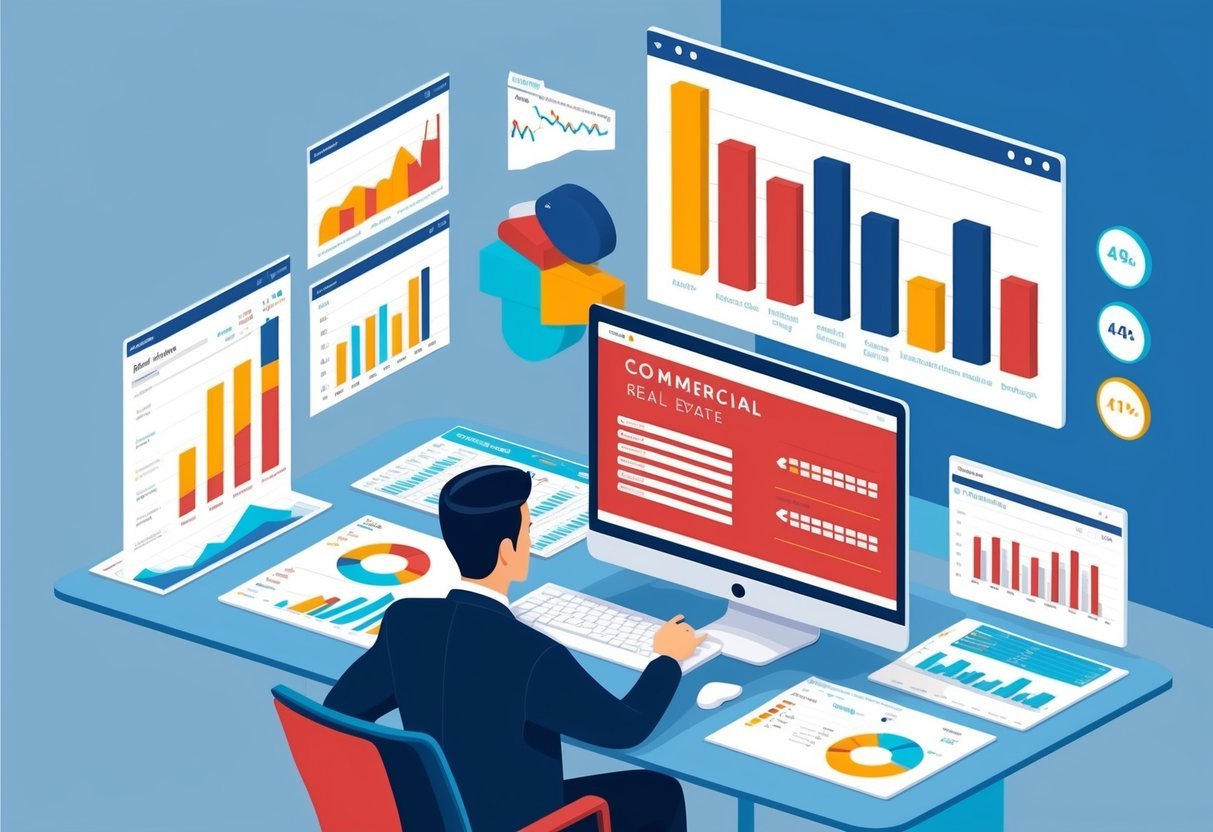
Accurate valuation is crucial for making informed commercial real estate investment decisions.
Key metrics and market analysis provide essential insights to determine a property’s true worth and potential.
Key Valuation Metrics
The capitalization rate (cap rate) is a fundamental metric in commercial real estate valuation.
You calculate it by dividing the property’s net operating income by its current market value.
A lower cap rate typically indicates lower risk and higher property value.
Another important metric is the gross rent multiplier (GRM).
This ratio compares a property’s price to its annual gross rental income.
For example, if a $1 million property generates $140,000 in annual gross rent, the GRM would be 7.14.
The net operating income (NOI) is also crucial.
It represents the property’s income after deducting operating expenses but before accounting for debt service and income taxes.
Market Trends Analysis
When evaluating commercial real estate, you must consider current market trends. Supply and demand dynamics significantly impact property values.
If demand exceeds supply in a particular area, prices are likely to rise.
Economic indicators such as job growth, population trends, and local business expansion can provide valuable insights into a market’s potential.
You should also examine vacancy rates and absorption rates to gauge market health.
Keep an eye on interest rates, as they affect borrowing costs and can influence property values.
Additionally, zoning changes, infrastructure developments, and shifts in consumer behavior can all impact commercial real estate values.
Financial Health Assessment
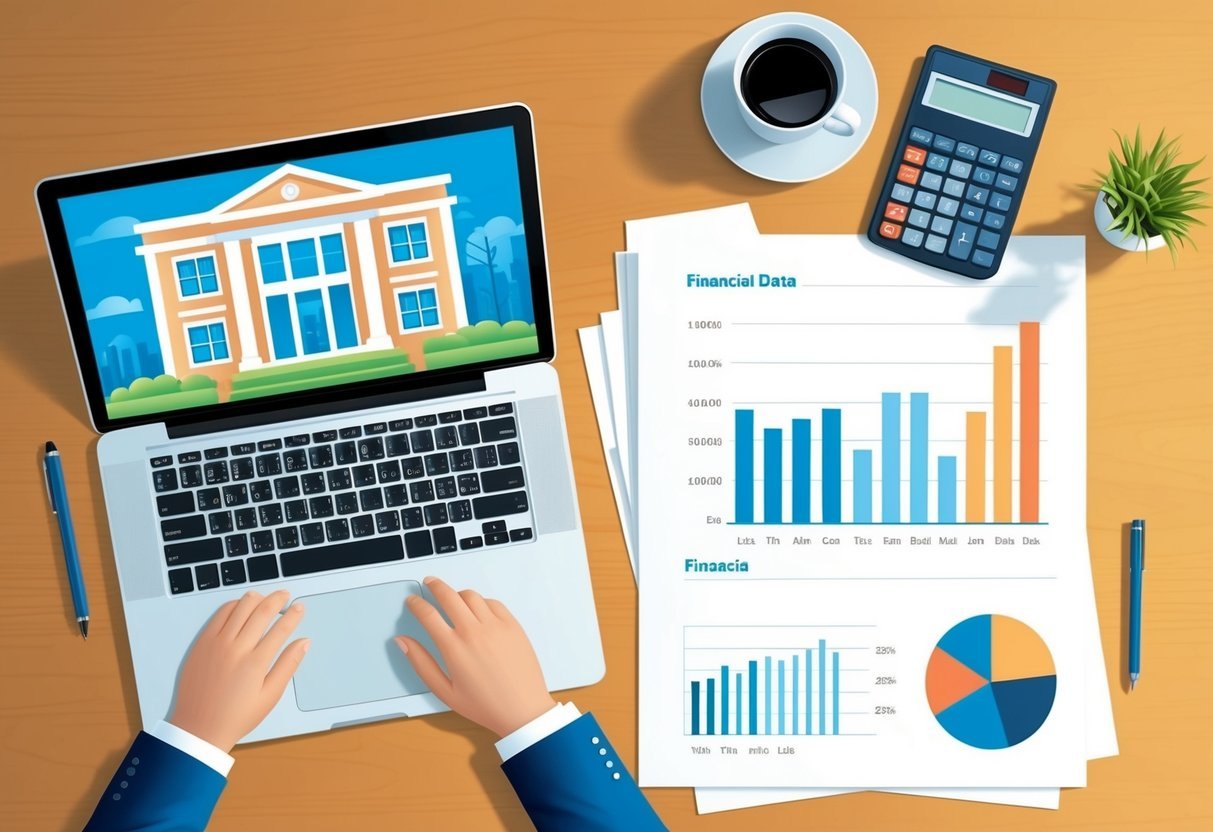
Assessing a property’s financial health is crucial for making informed investment decisions.
Accurate evaluation of cash flow and debt service coverage provides essential insights into a property’s potential profitability and risk level.
Cash Flow Analysis
Cash flow analysis is fundamental in evaluating commercial real estate deals.
You’ll need to examine the property’s income and expenses to determine its Net Operating Income (NOI).
Start by calculating the Gross Potential Income (GPI) – the total income if the property were fully occupied.
Then, subtract vacancy and credit losses to get the Effective Gross Income (EGI).
Next, deduct operating expenses such as maintenance, utilities, and property management fees from the EGI.
The resulting figure is your NOI, a key metric for assessing a property’s financial performance.
To get a complete picture, you should also factor in capital expenditures and debt service.
This will give you the property’s actual cash flow, helping you gauge its true profit potential.
Debt Service Coverage Ratio (DSCR)
The Debt Service Coverage Ratio is a critical metric in commercial real estate analysis.
It measures a property’s ability to cover its debt obligations using its operating income.
To calculate DSCR, divide the property’s NOI by its total debt service (principal and interest payments).
A DSCR of 1.0 means the property’s income exactly covers its debt payments.
Lenders typically require a minimum DSCR of 1.2 to 1.25, indicating a cushion for unexpected expenses or income fluctuations.
A higher DSCR suggests a lower risk investment.
You should analyze the DSCR trend over time.
An improving ratio indicates strengthening financial health, while a declining ratio may signal potential issues.
Risk Management Strategies

Effective risk management is crucial for successful commercial real estate investments.
Identifying and mitigating potential risks can protect your assets and maximize returns.
Environmental and Regulatory Risks
Environmental hazards pose significant threats to commercial properties.
Conduct thorough environmental assessments to identify potential contamination or hazardous materials.
You should be aware of asbestos, lead paint, and soil pollution risks.
Stay informed about zoning laws and building codes.
Regulatory changes can impact property use and value.
Regularly review local regulations to ensure compliance and avoid costly penalties.
Consider obtaining environmental insurance to protect against unforeseen issues.
This coverage can safeguard your investment from cleanup costs and liability claims.
Implement proactive measures to address potential environmental concerns.
Regular property inspections and maintenance can help prevent issues from escalating.
Tenant Creditworthiness
Assessing tenant creditworthiness is vital for stable cash flow.
Perform thorough background checks on potential tenants, including credit scores and financial statements.
Review past rental history and references to gauge reliability.
Look for tenants with strong business models and stable industries to reduce vacancy risks.
Consider requiring personal guarantees for leases, especially with newer businesses.
This additional security can protect your investment if the tenant faces financial difficulties.
Diversify your tenant mix to spread risk.
Avoid relying too heavily on a single industry or tenant type.
This strategy can help maintain steady income even if one sector experiences a downturn.
Regularly monitor tenant financial health throughout the lease term.
Early detection of potential issues allows you to take preventive action and minimize losses.
Frequently Asked Questions
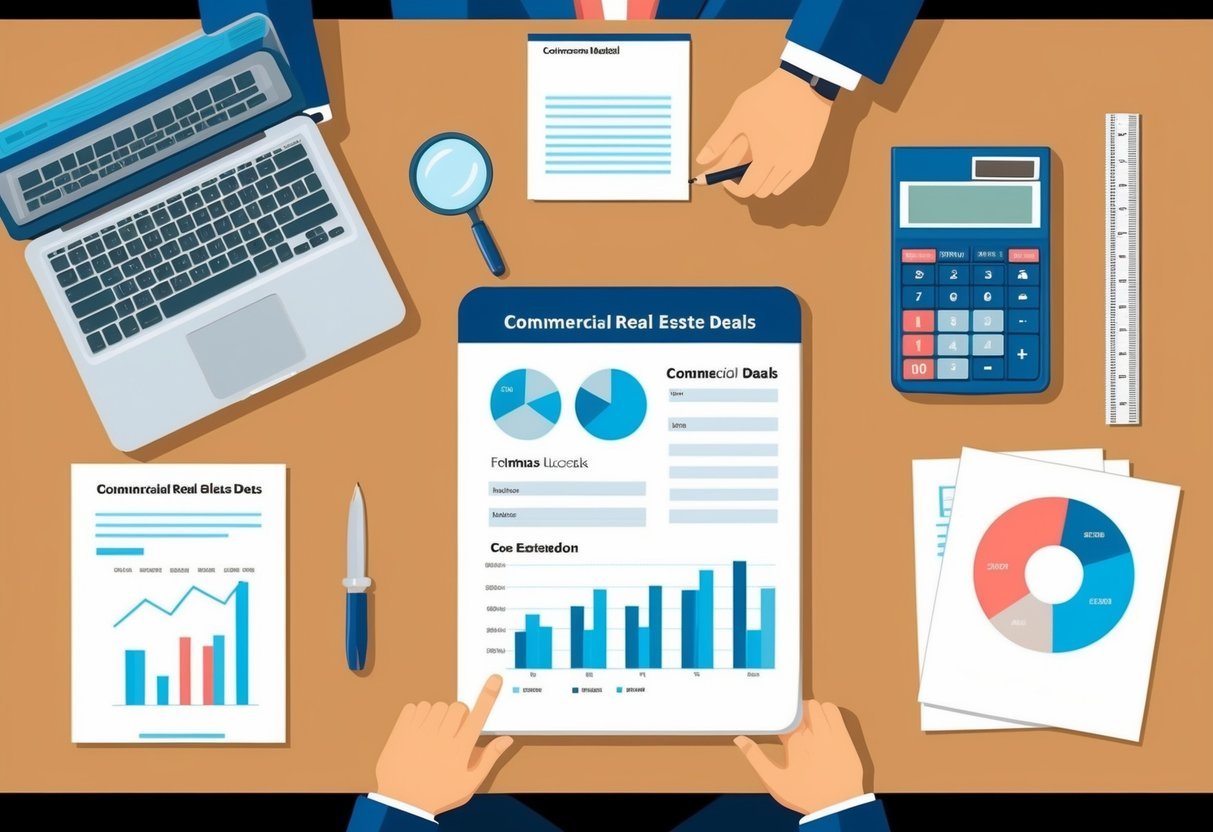
Evaluating commercial real estate deals requires specific tools and methodologies.
Understanding these can help you make informed investment decisions and optimize your portfolio’s performance.
What tools can be used for underwriting commercial real estate investments?
PropStream is a powerful platform for underwriting commercial properties.
It provides comprehensive property data, market trends, and financial analytics.
Reonomy offers in-depth property intelligence and owner contact information.
How is a commercial real estate property’s value typically appraised?
Appraisers often use the income approach to value commercial properties.
This method considers the property’s potential income and applies a capitalization rate.
Comparative market analysis and the cost approach are also common valuation techniques.
What software is recommended for analyzing rental property investments?
Real Capital Analytics provides extensive transaction data and market insights for rental property analysis.
CoStar offers detailed property information, market reports, and forecasting tools to help you evaluate potential investments.
Which excel templates are available for free to aid in investment property analysis?
Several websites offer free Excel templates for investment property analysis.
These typically include cash flow projections, ROI calculations, and sensitivity analyses.
CREmodels provides customizable templates for various property types.
Are there any free tools specifically for market analysis in commercial real estate?
You can access free market data from local Assessor’s Offices and Registry of Deeds.
These sources provide valuable information on property ownership, tax history, and recent transactions in your target area.
What features should a good commercial real estate deal analyzer include?
A robust deal analyzer should incorporate financial metrics like cap rate, cash-on-cash return, and internal rate of return.
It should also allow for scenario modeling, sensitivity analysis, and comparison of multiple investment opportunities.

